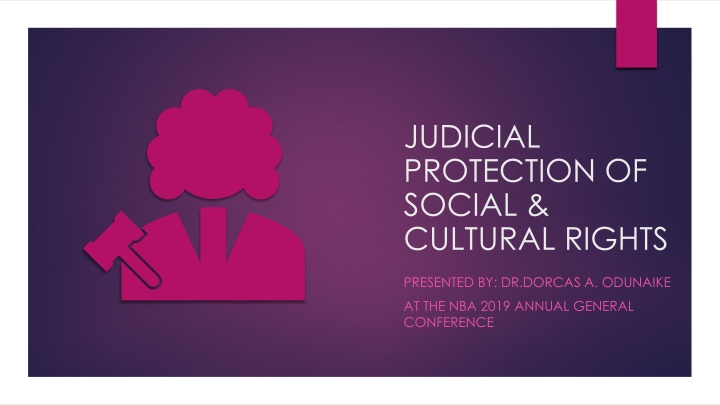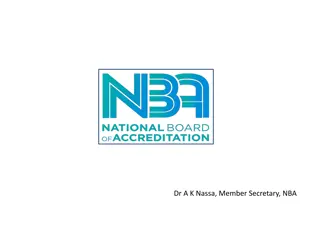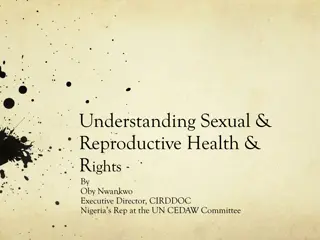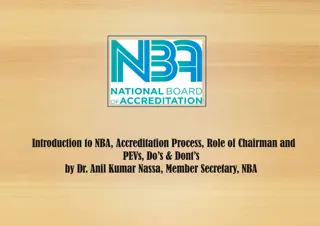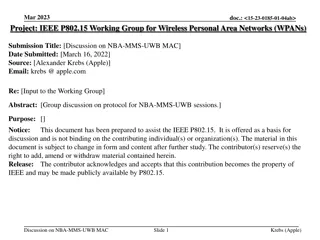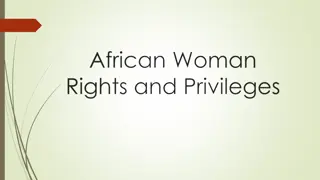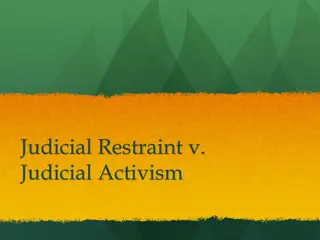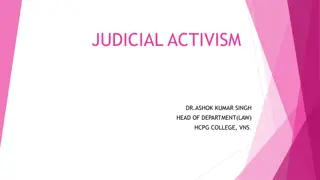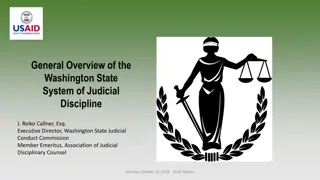Judicial Protection of Social and Cultural Rights in Nigeria: Insights from NBA 2019 Conference
Discussing the judicial protection of economic, social, and cultural rights in Nigeria, focusing on the challenges, international law dimensions, violations, and the role of the judiciary in upholding social and cultural rights. The presentation highlights the need for accountability and protection of social rights such as adequate livelihood, health facilities, education, and cultural rights including indigenous community self-determination and rights to science and protection of authorship interests.
Download Presentation

Please find below an Image/Link to download the presentation.
The content on the website is provided AS IS for your information and personal use only. It may not be sold, licensed, or shared on other websites without obtaining consent from the author.If you encounter any issues during the download, it is possible that the publisher has removed the file from their server.
You are allowed to download the files provided on this website for personal or commercial use, subject to the condition that they are used lawfully. All files are the property of their respective owners.
The content on the website is provided AS IS for your information and personal use only. It may not be sold, licensed, or shared on other websites without obtaining consent from the author.
E N D
Presentation Transcript
JUDICIAL PROTECTION OF SOCIAL & CULTURAL RIGHTS PRESENTED BY: DR.DORCAS A. ODUNAIKE AT THE NBA 2019 ANNUAL GENERAL CONFERENCE
Outline Introduction Social and Cultural Rights(SCR) defined Legal Framework Ouster Clause Section 6(6) 1999 Constitution & other challenges Existing Violation of SCR in Nigeria International Law dimension UDHR, ICESCR, Optional Protocol ICESCR and Regional Protection Recommendations Conclusion
Introduction In line with the theme of this year s NBA Annual General Conference Facing the Future , it is apt to discuss the judicial protection of economic, social and cultural rights in light of the provision of Section 6(6)(c)1999 Constitution of the Federal Republic of Nigeria (as amended) which renders it non- justiciable. Optional Protocol to the International Covenant on Economic, Social and Cultural Rights debunked the false assumption that SCR is not justiciable it enable ESCR right holders or victims of violation to present complaints before the UN Committee on ESCR whenever they cannot access justice in their own country. The emergence of social right jurisprudence underscore the need to make government accountable for social and cultural rights in practical terms The focus of this presentation is Social and Cultural Right - its Judicial Protection
Since the court has been made the guardian of the Constitution the Court has the Constitutional responsibility also legal and sociological to interpret the provisions of the Constitution in light of the socio- economic and cultural background of this country. Per Kayode Eso JSC
Social Rights includes right to adequate means of livelihood; right to basic health facilities; right to good environment; reasonable minimum wage; right to education; welfare of the disabled, the sick and other vulnerable people. unemployment benefits; and food and shelter; old age care;
Cultural Rights defined By the ICESCR cultural rights includes indigenous community to self-determination (from a socio-economic presumably excludes the civil and political dimension such as the right to secede)right to science, and a right to protection of authorship interests. These guarantee participate in and enjoy the benefits of culture and science, and relate to the pursuit of knowledge, understanding creativity. These rights form an important part of social harmony and are closely connected to the rights to education, conscience and religion. right of which dimension the right to and human freedom of thought,
Legal Framework Chapter 2 on Fundamental Objectives & Directive Principles of State Policy enshrine social and cultural rights. African Charter on Human and Peoples Rights (Ratification and Enforcement) Act, Cap A9 LFN 1990 now 2010 Article 15-18 Other Constitutional provisions Specific Laws Child Rights Act, 2003, Universal Basic Education (UBE) Act 2004
Contd exploitation of human or natural resources in any form whatsoever for reasons other than the good of the community shall be prevented; the Citizens shall have equal opportunity for securing adequate means of livelihood without discrimination; Conditions of work are just and humane; Adequate opportunities to secure suitable employment; independence, impartiality and integrity of courts of law and easy accessibility shall be secured and maintained;
Contd Safeguard the health, safety and welfare of all persons in employment; ensure the sanctity of human person; human dignity; Ensure adequate facilities for leisure, social, religious and cultural life; Ensure adequate, medical and health care facilities for all persons; Ensure equal pay for equal work without discrimination and equal right for all citizens Protect young persons and the aged against any exploitation whatsoever and against moral and material neglect
Contd Section 20 - the state shall protect and improve the environment and safeguard water, air and land, forest and wildlife of Nigeria. Encourage development of technological and scientific studies which enhance cultural values Section 21(a) the state shall protect, preserve and promote Nigerian cultures which enhance human dignity and are consistent with fundamental objectives.
Section 13 - it is the duty and responsibility of all organs of government, all authorities and persons exercising legislative, executive and judicial powers to conform to, observe and apply the provisions of chapter 2 of the constitution.
However, section 6(6)(c) of the 1999 Constitution of the Federal Republic of Nigeria (as amended) provides that the judicial powers of courts shall not extend to any issue or question as to whether any law or judicial decision is in conformity with the fundamental objectives and directive principles of state policy set out in Chapter II of the Constitution. This was affirmed in the case of Archbishop Anthony Okogie v AG Lagos State. No surprise the Supreme Court in AG Ondo and AG Federation rightly referred to Chapter II of the Constitution as mere declarations. To this end one can say that the fundamental objectives are what Yorubas call esin inu iwe ti ko le sare Ouster Clause
Leeway When there is failure to comply with Section 13, the Supreme Court in AG Ondo and AG Federation held that courts cannot enforce any of the provisions of Chapter II of the Constitution until the National Assembly has enacted specific laws for their enforcement (meaning that specific laws can make them justiciable). Specific Laws Child Rights Act, 2003 Other Constitutional provisions - S.6(6)(c) except as otherwise provided by this constitution
Domestication of African Charter Nigeria is a signatory to the International Covenant on Economic, Social and Cultural Rights and the African Charter on Human and Peoples Rights hence the provision of these covenants are parts of Nigerian laws see Alhaji Sani Dododo v Economic and Financial Crimes Commission & Ors. where relying on the relevant provisions of African Charter on Human and Peoples Rights Act, the Court of Appeal held that the African Charter is now part of the laws of this country protecting the socio- economic rights of citizens. Also in Ubani v Director SSS (1999) 11 NWLR pt. 625 at 129 the Court of Appeal held that the African Charter has entrenched the socio- economic rights of a person and enjoined the courts to ensure the observance of these rights.
Optional Protocol to the International Covenant on Economic, Social and Cultural Rights Not yet ratify Optional Protocol to the International Covenant on Economic, Social and Cultural Rights adopted December 10, 2008 came into force May 5, 2013 - It is an international treaty by which victims of violation of ESCR can present complaints at the international level (before the UN Committee on ESCR) especially when one cannot access justice in his/her country. However, it reinforces that all rights violations must have a remedy first and foremost in their own country. Optional Protocol Procedures (i) Complaints Procedure (ii) Inquiries Procedure (iii) Inter-State Complaints Procedure. Note that complainants must have exhausted all available remedies in their own country unless they are unreasonably prolonged
Existing Violations of SCR in Nigeria NO EQUAL OPPORTUNITY FOR SECURING ADEQUATE MEANS OF LIVELIHOOD WITHOUT DISCRIMINATION; INADEQUATE OPPORTUNITIES TO SECURE SUITABLE EMPLOYMENT; CONDITIONS OF WORK NOT JUST AND HUMANE IN ALL CASES INADEQUATE FACILITIES FOR LEISURE, SOCIAL, RELIGIOUS AND CULTURAL LIFE; INADEQUATE, MEDICAL AND HEALTH CARE FACILITIES;
Lack of specific laws that can enhance enforcement of SCR For example the deplorable state of healthcare facilities See also SERAP Report on Failing Healthcare Other Challenges Corruption SERAP report on Darkness to Darkness (corruption in Electricity Sector) also SERAP report on Stealing the Future (corruption in Federal Universities) Law technicalities Public Interest Litigation
Recommendations In line with decision of Court in Attorney General of Ondo State and others v Attorney General of the Federation that Chapter 2 of the constitution can be made enforceable by legislation the National Assembly should enact specific laws on each of these social and cultural rights so as to enforce each right in courts of law when violated. Section 6(6)(c) be amended to read shall extend to .., delete not Courts should deepen its progressive attitude to public interest litigation Delete as and when practicable from Section 18 (3) 1999 Constitution so that state and federal government can be duty bound to provide free education to tertiary level.
In conclusion It is in line with the motto of NBA (promoting the rule of law) to be in the forefront of an advocacy for the removal or amendment of Section 6(6)(c) of the 1999 Constitution in order to enhance the judicial protection of ESCR in Nigeria. Affording every citizens social and cultural rights is a prerequisite to the enjoyment of other basic rights.
